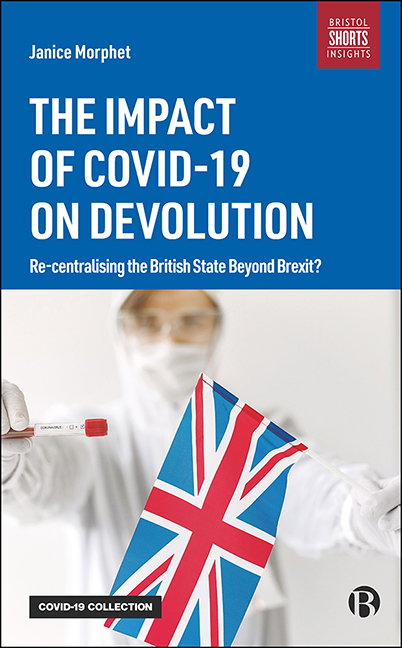Book contents
- Frontmatter
- Contents
- Preface
- List of Abbreviations
- one Devolution in the UK: The Twin Challenges of Brexit and COVID-19
- two Central Government, Brexit and COVID-19: Centralisation Through Privatisation?
- three The Role of the Devolved Nations in Meeting COVID-19
- four Getting to the Local: Managing the Pandemic in Practice
- five COVID-19 and a UK Unitary State Post-Brexit?
- References
- Index
three - The Role of the Devolved Nations in Meeting COVID-19
Published online by Cambridge University Press: 04 January 2022
- Frontmatter
- Contents
- Preface
- List of Abbreviations
- one Devolution in the UK: The Twin Challenges of Brexit and COVID-19
- two Central Government, Brexit and COVID-19: Centralisation Through Privatisation?
- three The Role of the Devolved Nations in Meeting COVID-19
- four Getting to the Local: Managing the Pandemic in Practice
- five COVID-19 and a UK Unitary State Post-Brexit?
- References
- Index
Summary
Introduction
In the response to the COVID-19 pandemic, all states have taken their own approaches based on their conditions and existing distribution of responsibilities between tiers of government. While the WHO advice from the outset was to manage the pandemic at a local level, with a focus on track, trace and isolate (WHO 2020), the extent to which this has been undertaken, even within more developed countries, has varied (Christensen and Lægreid 2020; Beaubien 2020). Within the UK, the responsibilities for public health are devolved and, while the four countries worked together at the outset in managing the pandemic (Sargeant 2020), this shifted once the PM started to adopt a different approach for England. The JMC was not invoked in the first days of the pandemic and instead the FMs were invited to participate in COBRA meetings (Sargeant 2020), but this arrangement started to disintegrate when the PM decided to move more quickly out of lockdown in England. This differentiated approach has had important effects on the perception of the devolved nations, the strength of their leadership, and the exercise of their autonomy.
The differences in managing the pandemic in the four UK nations has highlighted the reality of devolution in ways that have not been apparent before to those living in England (Cushion et al 2020). The pandemic has given the devolved nations and their leaders a national stage in new ways. During the course of the pandemic, the FMs in Wales and Scotland have become recognised figures across the UK and their actions have provided a stark contrast with those taken by the PM. Many of the initiatives adopted in Scotland and Wales, ahead of England, have been dismissed and belittled by the PM only to be adopted shortly afterwards. These range from the adoption of face coverings to the management of examination results for 16-and 18-year-old school students.
Within the period of the pandemic, the UK was negotiating its post-Brexit trade deal with the EU for when transition ended on 31 December 2020. For the devolved administrations, their Parliaments and Assembly were founded on the powers associated with the implementation of EU directives and regulations within the UK, and these were supplemented by further financial powers for Scotland in 2012 following further EU subsidiarity agreements in 2009 (Pazos-Vidal 2019).
- Type
- Chapter
- Information
- The Impact of COVID-19 on DevolutionRecentralising the British State beyond Brexit?, pp. 37 - 54Publisher: Bristol University PressPrint publication year: 2021



